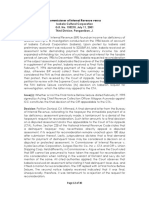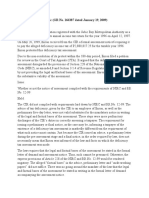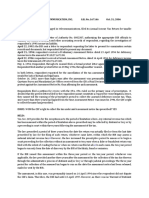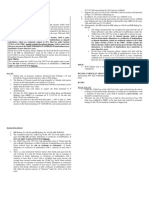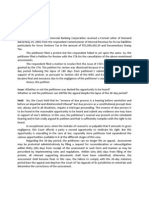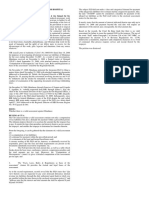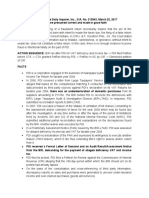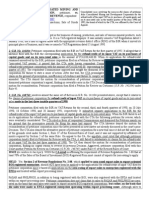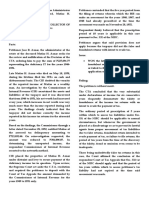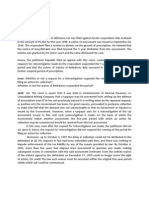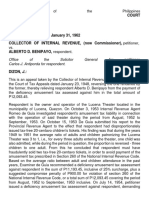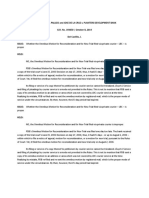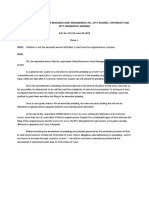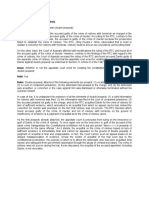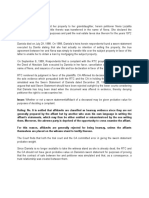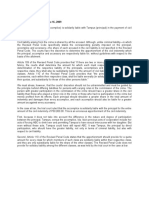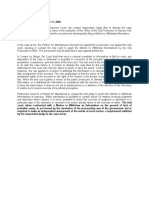CIR Vs Benipayo G.R. L-13656
CIR Vs Benipayo G.R. L-13656
Uploaded by
MACCopyright:
Available Formats
CIR Vs Benipayo G.R. L-13656
CIR Vs Benipayo G.R. L-13656
Uploaded by
MACOriginal Description:
Original Title
Copyright
Available Formats
Share this document
Did you find this document useful?
Is this content inappropriate?
Copyright:
Available Formats
CIR Vs Benipayo G.R. L-13656
CIR Vs Benipayo G.R. L-13656
Uploaded by
MACCopyright:
Available Formats
Collector of Internal Revenue vs Alberto Benipayo
G.R. No. L- 13656 (1962)
Facts:
Benipayo is the owner and operator of the Lucena Theater in Lucena, Quezon. He sells 40-
centavo tickets for adults and 20-centavo (tax free) children’s tickets. In 1953, an internal revenue
agent investigated his amusement tax liability in connection with the operation of the theater from
August 1952 to September 1952. The following are his findings:
• In the years 1949 to 1951, the average ratio of adults and children patronizing the theater
was 75:25 (or 3:1)
• In the returns filed for July 1-11 (where no internal revenue agent was supervising the
sales), it showed that 31.43% are adults and 68.75% are children. For July 14-24 (where
internal revenue agents were present), the sales for adults soared to 76% and 24% for the
children.
Based on such findings, the internal revenue officer recommended a deficiency amusement
tax. The Court of Appeals reversed the decision of the Collector of Internal Revenue.
Issue: Whether or not there is sufficient evidence in the record showing that Benipayo sold and
issued to his adult customers tax-free children’s tickets to cheat and defraud the government
Ruling: There are no substantial facts to support the assessment in question.
An assessment fixes and determines the tax liability of a taxpayer. As soon as it is served,
an obligation arises on the part of the taxpayer concerned to pay the amount assessed and
demanded. Hence, assessments should not be based on mere presumptions no matter how
reasonable or logical said presumptions may be. It must be based on actual facts. The fact that
almost the same ratio existed during the month of July, 1955 does not provide a sufficient inference
on the conditions in 1952 and 1953. The presumption of correctness of assessment being a mere
presumption cannot be made to rest on another presumption. Moreover, fraud is a serious charge
and, to be sustained, it must be supported by clear and convincing proof which, in the present case,
is lacking.
You might also like
- Altobano-Ruiz v. PichayDocument2 pagesAltobano-Ruiz v. PichayMACNo ratings yet
- 5 - CIR vs. Hon. Raul M. GonzalezDocument6 pages5 - CIR vs. Hon. Raul M. GonzalezJaye Querubin-FernandezNo ratings yet
- 16 Republic Vs GMCC United Development CorpDocument2 pages16 Republic Vs GMCC United Development CorpIsh100% (1)
- Cir Vs United Salvage and Towage Case DigestDocument1 pageCir Vs United Salvage and Towage Case DigestjovifactorNo ratings yet
- Estate of Reyes V CIR Case DigestDocument2 pagesEstate of Reyes V CIR Case DigestAlexis Anne P. ArejolaNo ratings yet
- CIR V FMFDocument21 pagesCIR V FMFPatatas SayoteNo ratings yet
- CIR V MINDANAO SANITARIUM AND HOSPITAL INCDocument4 pagesCIR V MINDANAO SANITARIUM AND HOSPITAL INCAlexis Anne P. ArejolaNo ratings yet
- St. Stephen's Association V CIRDocument3 pagesSt. Stephen's Association V CIRPatricia GonzagaNo ratings yet
- 9.BPI vs. CIRDocument1 page9.BPI vs. CIRBam Bathan100% (1)
- CIR v. COA (G.R. No. 101976. January 29, 1993.)Document1 pageCIR v. COA (G.R. No. 101976. January 29, 1993.)Emmanuel YrreverreNo ratings yet
- CIR vs. Isabela Cultural Corporation 135210Document1 pageCIR vs. Isabela Cultural Corporation 135210magenNo ratings yet
- CIR Vs Enron SubicDocument2 pagesCIR Vs Enron SubicArnold JoseNo ratings yet
- CIR V Philippine Global CommunicationDocument2 pagesCIR V Philippine Global CommunicationGenevieve Kristine Manalac100% (1)
- 40 Nippon Life V CIRDocument2 pages40 Nippon Life V CIRMae SampangNo ratings yet
- Lascona Land Vs CIRDocument2 pagesLascona Land Vs CIRJOHN SPARKSNo ratings yet
- Cir V. Team Sual Corporation: Doctrine/SDocument3 pagesCir V. Team Sual Corporation: Doctrine/SDaLe AparejadoNo ratings yet
- Fitness Vs CIR - Powers of The CIRDocument3 pagesFitness Vs CIR - Powers of The CIRCarl MontemayorNo ratings yet
- Bureau of Internal Revenue Vs Spouses Antonio ManlyDocument1 pageBureau of Internal Revenue Vs Spouses Antonio Manlyanon100% (1)
- CIR vs. FMF Development Corporation 167765Document1 pageCIR vs. FMF Development Corporation 167765magenNo ratings yet
- Samar-I Electric Cooperative vs. CirDocument2 pagesSamar-I Electric Cooperative vs. CirRaquel DoqueniaNo ratings yet
- Alcantara vs. Republic (Digest)Document1 pageAlcantara vs. Republic (Digest)Kristofer AralarNo ratings yet
- CIR v. Ayala HotelsDocument20 pagesCIR v. Ayala HotelsnoonalawNo ratings yet
- Samar Electric Cooperative vs. CIRDocument3 pagesSamar Electric Cooperative vs. CIRAnneNo ratings yet
- CIR v. MINDANO II (G.R. No. 191498. January 15, 2014.)Document2 pagesCIR v. MINDANO II (G.R. No. 191498. January 15, 2014.)Emmanuel YrreverreNo ratings yet
- CIR vs. Silicon Philippines, GR 169778Document5 pagesCIR vs. Silicon Philippines, GR 169778Ma. Consorcia GoleaNo ratings yet
- Pilmico-Maurifoodcorp Cir Ctano.6151Document3 pagesPilmico-Maurifoodcorp Cir Ctano.6151Nathallie CabalunaNo ratings yet
- Philippine Journalists, Inc. vs. CIRDocument3 pagesPhilippine Journalists, Inc. vs. CIRCourtney TirolNo ratings yet
- CIR V Fitness by DesignDocument3 pagesCIR V Fitness by Designsmtm06100% (4)
- American Express International v. CIR CTA Case No. 6099 (April 19, 2002)Document2 pagesAmerican Express International v. CIR CTA Case No. 6099 (April 19, 2002)Francis Xavier Sinon100% (1)
- Cir v. MeralcoDocument2 pagesCir v. MeralcoKhaiye De Asis AggabaoNo ratings yet
- Philamlife V Cta Case DigestDocument2 pagesPhilamlife V Cta Case DigestAnonymous BvmMuBSwNo ratings yet
- RCBC V CIRDocument2 pagesRCBC V CIRPJ Hong100% (1)
- ECONOMIC BENEFIT THEORY - BIR Ruling No. 123-97 (Retirement and Separation Benefits Paid To Employees)Document2 pagesECONOMIC BENEFIT THEORY - BIR Ruling No. 123-97 (Retirement and Separation Benefits Paid To Employees)KriszanFrancoManiponNo ratings yet
- CIR V. TRANSITIONS OPTICAL PHILIPPINES, INC. (G.R. No. 227544, November 22, 2017)Document2 pagesCIR V. TRANSITIONS OPTICAL PHILIPPINES, INC. (G.R. No. 227544, November 22, 2017)Digna LausNo ratings yet
- CIR vs. Enron Subic Power CorporationDocument1 pageCIR vs. Enron Subic Power CorporationArthur Archie TiuNo ratings yet
- Rizal Commercial Banking vs. CIRDocument3 pagesRizal Commercial Banking vs. CIRMarife MinorNo ratings yet
- Pagcor V Bir: Information Request Item Approval OthersDocument7 pagesPagcor V Bir: Information Request Item Approval OthersJohn Evan Raymund Besid100% (1)
- 23 Cir Vs Mindanao Sanitarium and HospitalDocument5 pages23 Cir Vs Mindanao Sanitarium and HospitalSecret Secret0% (1)
- Cir v. Febtc DigestDocument2 pagesCir v. Febtc DigestNelly HerreraNo ratings yet
- McDonald's Philippines Realty Corporation v. CIRDocument2 pagesMcDonald's Philippines Realty Corporation v. CIRPrincess Domingo100% (1)
- Bantillo - CIR Vs PNBDocument3 pagesBantillo - CIR Vs PNBAto Teja100% (1)
- Republic V Salud HIzonDocument2 pagesRepublic V Salud HIzonPJ Hong100% (1)
- Commissioner of Internal Revenue vs. Philippine Daily Inquirer, IncDocument3 pagesCommissioner of Internal Revenue vs. Philippine Daily Inquirer, IncMich Lopez100% (1)
- CIR v. Fitness by DesignDocument4 pagesCIR v. Fitness by DesignJesi CarlosNo ratings yet
- Atlas Consolidated Mining and Development Corporation v. CIRDocument7 pagesAtlas Consolidated Mining and Development Corporation v. CIRCoco LocoNo ratings yet
- Mannasoft v. CirDocument2 pagesMannasoft v. CirluckyNo ratings yet
- People v. Kintanar CTADocument3 pagesPeople v. Kintanar CTAMark CapaciteNo ratings yet
- Aznar vs. CTA - Case DigestDocument2 pagesAznar vs. CTA - Case DigestKaren Mae ServanNo ratings yet
- DOF Order 7-2002Document3 pagesDOF Order 7-2002Agnes Bianca MendozaNo ratings yet
- Republic V Acebedo G.R No. L-20477 March 29, 1968Document2 pagesRepublic V Acebedo G.R No. L-20477 March 29, 1968PJ HongNo ratings yet
- Digest of Ramsay vs. CIR, CTA Case No. 8456, September 17, 2015Document2 pagesDigest of Ramsay vs. CIR, CTA Case No. 8456, September 17, 2015Michael Joseph NogoyNo ratings yet
- Oceanic Wireless Network v. CIR - G.R. No. 148380 (2005)Document3 pagesOceanic Wireless Network v. CIR - G.R. No. 148380 (2005)SophiaFrancescaEspinosaNo ratings yet
- Bonifacia Sy Po Vs CTADocument2 pagesBonifacia Sy Po Vs CTACarl Montemayor50% (2)
- Tang Ho V Board of Tax AppealsDocument1 pageTang Ho V Board of Tax AppealsKara Aglibo100% (1)
- CIR v. Smith Kline / G.R. No. L-54108 / January 17, 1984Document1 pageCIR v. Smith Kline / G.R. No. L-54108 / January 17, 1984Mini U. SorianoNo ratings yet
- Republic of The PH vs. Lim de Yu DGDocument1 pageRepublic of The PH vs. Lim de Yu DGKimberly RamosNo ratings yet
- CIR V Isabela Cultural Corp, GR No. 135210Document2 pagesCIR V Isabela Cultural Corp, GR No. 135210Lilaben SacoteNo ratings yet
- REPUBLIC OF THE PHILIPPINES Versus THE COURT OF APPEALS, and NIELSON & COMPANY, INC.Document1 pageREPUBLIC OF THE PHILIPPINES Versus THE COURT OF APPEALS, and NIELSON & COMPANY, INC.Charles Roger RayaNo ratings yet
- 6.18 CIR Vs BenipayoDocument4 pages6.18 CIR Vs BenipayoMeg VillaricaNo ratings yet
- G.R. No. L-13656 January 31, 1962 COLLECTOR OF INTERNAL REVENUE, (Now Commissioner), Petitioner, ALBERTO D. BENIPAYO, RespondentDocument3 pagesG.R. No. L-13656 January 31, 1962 COLLECTOR OF INTERNAL REVENUE, (Now Commissioner), Petitioner, ALBERTO D. BENIPAYO, RespondentMarie Nickie BolosNo ratings yet
- 215-CIR v. Benipayo G.R. No. L-13656 January 31, 1962Document3 pages215-CIR v. Benipayo G.R. No. L-13656 January 31, 1962Jopan SJNo ratings yet
- G.R. No. 193650, October 8, 2014Document2 pagesG.R. No. 193650, October 8, 2014MAC100% (1)
- G.R. No. 211113, June 29, 2015Document1 pageG.R. No. 211113, June 29, 2015MACNo ratings yet
- Estipona, Jr. v. LobrigoDocument2 pagesEstipona, Jr. v. LobrigoMACNo ratings yet
- Cerezo v. PeopleDocument1 pageCerezo v. PeopleMACNo ratings yet
- Soriano v. PeopleDocument1 pageSoriano v. PeopleMACNo ratings yet
- G.R. NO. 151932, August 19, 2009Document1 pageG.R. NO. 151932, August 19, 2009MACNo ratings yet
- Co. v. New Prosperity Plastic ProductsDocument2 pagesCo. v. New Prosperity Plastic ProductsMACNo ratings yet
- People v. de LeonDocument1 pagePeople v. de LeonMACNo ratings yet
- Enrile v. PeopleDocument1 pageEnrile v. PeopleMAC0% (1)
- Daan v. SandiganbayanDocument2 pagesDaan v. SandiganbayanMAC100% (1)
- People v. DumlaoDocument1 pagePeople v. DumlaoMAC100% (1)
- People v. PangilinanDocument1 pagePeople v. PangilinanMACNo ratings yet
- People v. EstomacaDocument2 pagesPeople v. EstomacaMACNo ratings yet
- People v. JanjalaniDocument1 pagePeople v. JanjalaniMACNo ratings yet
- Napoles v. SandiganbayanDocument1 pageNapoles v. SandiganbayanMACNo ratings yet
- Tating Vs MarcellaDocument1 pageTating Vs MarcellaMACNo ratings yet
- Hilario vs. PeopleDocument1 pageHilario vs. PeopleMACNo ratings yet
- People vs. AsisDocument1 pagePeople vs. AsisMACNo ratings yet
- People vs. BaronDocument1 pagePeople vs. BaronMACNo ratings yet
- Abellana vs. PeopleDocument1 pageAbellana vs. PeopleMACNo ratings yet
- People vs. MonteclarosDocument1 pagePeople vs. MonteclarosMACNo ratings yet
- Hipos, Sr. vs. BayDocument1 pageHipos, Sr. vs. BayMACNo ratings yet
- People vs. OlivoDocument1 pagePeople vs. OlivoMACNo ratings yet
- Balaba vs. PeopleDocument1 pageBalaba vs. PeopleMACNo ratings yet
- SCC Chemicals Corp Vs CADocument2 pagesSCC Chemicals Corp Vs CAMACNo ratings yet
- Macapagal Arroyo vs. PeopleDocument1 pageMacapagal Arroyo vs. PeopleMACNo ratings yet
- Laureano Vs CADocument1 pageLaureano Vs CAMACNo ratings yet
- People Vs SalafrancaDocument2 pagesPeople Vs SalafrancaMACNo ratings yet










